M2U1 Grammar 1牛津英语模块2语法
牛津高中英语模块二第一单元M2 U1复习
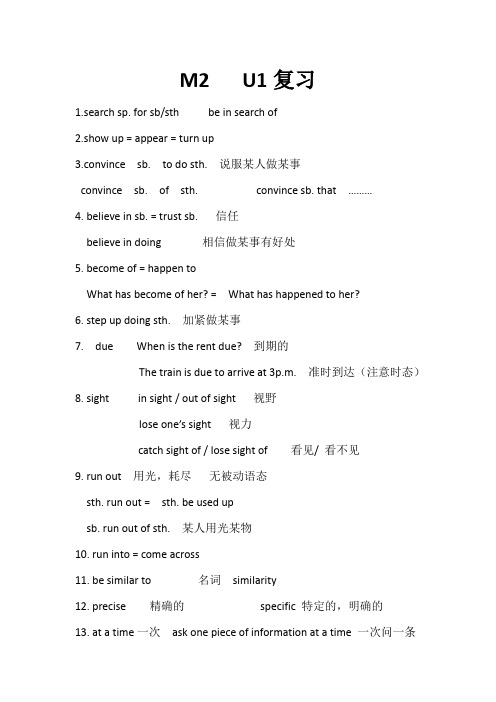
M2 U1复习1.search sp. for sb/sth be in search of2.show up = appear = turn up3.convince sb. to do sth. 说服某人做某事convince sb. of sth. convince sb. that ………4. believe in sb. = trust sb. 信任believe in doing 相信做某事有好处5. become of = happen toWhat has become of her? = What has happened to her?6. step up doing sth. 加紧做某事7. due When is the rent due? 到期的The train is due to arrive at 3p.m. 准时到达(注意时态)8. sight in sight / out of sight 视野lose one’s sight 视力catch sight of / lose sight of 看见/ 看不见9. run out 用光,耗尽无被动语态sth. run out = sth. be used upsb. run out of sth. 某人用光某物10. run into = come across11. be similar to 名词similarity12. precise 精确的specific 特定的,明确的13. at a time一次ask one piece of information at a time 一次问一条信息at one time =once 曾经,一度14. point out 指出point out mistakes in the sentencepoint to指向point to twelve 指针指向12点point at 习惯上表示指向离说话人较近的事物,着重指着的对象15. the + 形容词表示一类人或事the unexplained the unknown 未知事物the old 老人the young 年轻人。
牛津高中英语模块二 Unit 2 grammar1完美版

Will you be visiting your uncle in Tanzania?
Make polite enquiries about other people’s future plans.
How to form the future continuous tense
Toby will be climbing in the Himalayas all next week. Toby will not be in London next Tuesday. He will be climbing in the Himalayas. The weather report says that it will be raining when we arrive in London. Will you be visiting your uncle in Tanzania?
Suggested answers: 1 We will be having a meeting from 3 to 4 this afternoon. 2 I believe he’ll be coming soon. 3 I will be seeing a friend off this afternoon. 4 I don’t know when we will be working together again. 5 Mr. and Mrs. Smith are going to Brazil next week, and they will be traveling in Mexico later in the month.
牛津高中英语模块一UNIT2 M1U2 Grammar

4. 关系副词when, where和why也可用“介词+which”来代
替,要注意其先行词(名词)与介词的合理搭配,介词根
据先行词或定语从句的谓语动词来确定。
when 相当于“at/in/during…+which”
where 相当于“in/at/on…+which”
why 相当于“for + which”
等;
why 作原因状语,先行词是表示原因的名词,如reason.
1. He remember the day _____ when his father died. when 作时间状语,意为 on the day
2. I went back to the place ______ where I was born and grew up. where 作地点状语,意为in the place 3. Please give me the reason ____ why you were late this time. why作原因状语,意为for the reason
结论:只有当 “介词+关系代词”充当地点状语、时 间状语或原因状语时,才能用关系副词代替。
注意:关系副词与关系代词在定语从句中的关系:“介词+关系 代词”在从句中作状语相当于一个关系副词。如: 王先生工作的那家工厂是一家鞋厂。
1. The factory that/which Mr. Wang works in is
expect good decisions. (P28)
[考点] 在定语从句中,如果先行词是人,介词后面的
关系代词用whom。介词 + whom在定语从句中作状语。
[练习1] We
(完整word版)牛津高中英语模块2语言点讲学稿

M2 unit 1 Tales of the unexplainedWelcome to the unit知识点1.carry out: 进行;执行;履行;实施eg. You must carry out my ordersThey are carrying out an experiment.Will you carry out your promise?The plan will be carried out next week.2.explain用法:explain sth. to sb.eg. The teacher is trying to explain the problem to the students.explain to sb. sth. eg. He explained to me why he was late.词形转换:explanation n. 解释eg. You didn’t keep your promise! We need an explanation!unexplained adj. 无法解释的eg. The boy went missing for some unexplained reasons.3.discuss vt.讨论eg. They are discussing when they will have a picnic.I will discuss the problem with you tonight.词形转换:discussion n. 讨论4.run into1)撞上eg. The car ran into a tree. Luckily, no one was injured.2)偶遇,遇到= come across eg. I ran into an old friend in the park last night.5.believe in1)= trust 信任eg. He is reliable. You can believe in him.2)= have confidence in 对…有信心eg. Believe in yourself. You will succeed.3)信仰;相信…的存在eg. We don’t believe in ghosts.Many people in the village believe in the God.4)相信…的好处eg. I believe in doing morning exercise.6.tell vt. 区分,辨别eg. I can’t tell if he is telling the truth.How can I tell whether he is an honest man?搭配:tell A from B 把A从B中区分开tell the difference between…区分出…之间的差异eg. I can't tell him from his twin brother. 我分不出他和他的孪生兄弟。
牛津 M2U1 grammar 教案

Module 2 Unit 1 Tales of the Unexplained实习老师:聂姗指导老师:刘超老师Time of Lesson: 90 minutesStudents: C1110Lesson Type: Grammar and usageTeaching aims:Learn the grammar Present perfect tense and Present perfect continuous tense. Teaching important points:(1) Learn how to form and use the present perfect tense.(2) Understand when the present perfect continuous tense is used in sentences. Teaching methods: Explaining and practicing.Teaching aids:The multi-media.Teaching procedures:Step 1: Lead- in(1) Review the simple past tense(2) Lead into the present perfect tense and its usageStep 2: Present perfect tense(1) The form of the present perfect tense: has/ have done.(2) Talk about the uses of the present perfect tense.①We use the present perfect tense to talk about things that happened in the recent past, but are connected to the present. 表示过去发生的事对现在仍有影响。
高一英语M2 U1 Grammar2课件牛津英语_必修2

She _h_a_s_v_i_s_it_e_d_ (visit) Japan twice this month.
He _h_a_s__b_e_e_n__to_u_r_i_n_g(tour) America for two months.
Note: The present perfect continuous tense can’t be used with time expressions such as twice or how many times, because in this tense the action is continuous, not stopped and started again. We can use the present perfect tense for repeated actions, and the present perfect continuous tense for non-stop actions.
present perfect
_________________________________________
past perfect past
now future
present perfect continuous
_________________________________________
Summary 1:
1.We use the present perfect continuous tense to talk about actions that started in the past and are still continuing.
I have not been sleeping well since I returned home.
M2U1 Grammar 1牛津英语模块2语法
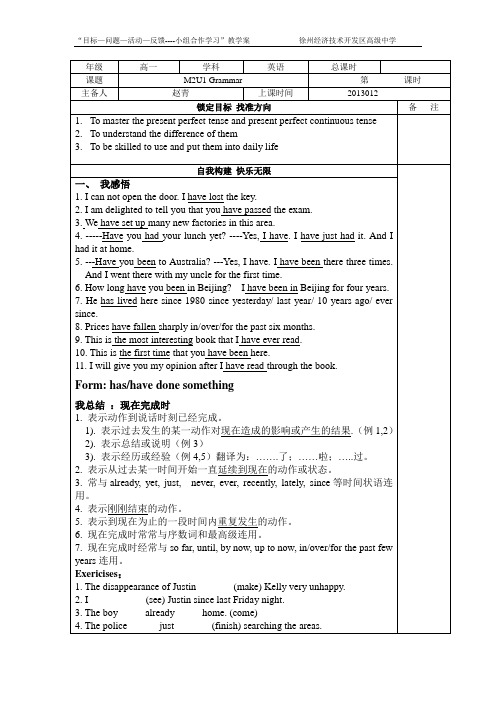
3.The farmers started working in the field an hour ago, and they are still working now,and may continue.Theyhave been workingin the field for an hour.
6.现在完成时常常与序数词和最高级连用。
7.现在完成时经常与so far, until, by now, up to now, in/over/for the past few years连用。
Exericises:
1.The disappearance of Justin_______(make)Kelly very unhappy.
8. Priceshave fallensharply in/over/for the past six months.
9. This isthe most interestingbook thatIhave ever read.
10.Thisisthe first timethat youhave beenhere.
6. How longhaveyoubeeninBeijing?Ihave been inBeijingfor four years.
7. Hehas livedhere since 1980 since yesterday/ last year/ 10 years ago/ ever since.
3).表示经历或经验(例4,5)翻译为:…….了;……啦;…..过。
2.表示从过去某一时间开始一直延续到现在的动作或状态。
高中译林牛津英语模块二Unit1grammar

• He has died.
• He has been died for one year.
• He has been dead for one year.
注意:非延续性动词的否定形式可以与表示 延续时间的状语连用。即动作不发生的状态 是可以持续的。 判断正误:
(F )I’ve got his letter for a month. (T )I got this letter a month ago. (T)I haven't received his letter for
A. was B. have been C. came D. am coming (2) ---Have you _D___ been to our town before? ---No, it's the first time I ___ here. A. even, come B. even, have come C. ever, come D. ever, have come
• 6 The police_h_a_v_e_f_in_i_s_h_e_d_ ( finish) searching the area.
现在完成时与一般过去时的区别:
• 一般过去时表示发生在过去的 动作,和现在无关;现在完成 时则强产 生的结果或影响等。
• 2 Eric __l_e_ft___ (leave) home last
year and h_a_s__ju_s_t_c_o_m_e_ (just come)
back.
• 3 Justin __h_a_s_b_e_e_n__ (be) away
from home for several days. He
通常使用现在完成时的几种情况:
(完整word)牛津高中英语模块1到模块11目录及语法点

《牛津高中英语》必修模块(1―5)Module 1 Teenage experiencesUnit 1 School lifeUnit 2 Growing painsUnit 3 Looking good, feeling goodGrammar and Language Points:attributive clauses(定语从句)Module 2 Making discoveriesUnit 1 Tales of the unexplainedUnit 2 Wish you were hereUnit 3 Amazing peopleGrammar and Language Points:present perfect tense,present continuous tense,future continuous tense,future in the past, past perfect tense(现在完成时、现在完成进行时、将来进行时,过去将来时,过去完成时)Module 3 Broadening horizonsUnit 1 The world of our sensesUnit 2 LanguageUnit 3 Back to the past Grammar and Language Points: noun clauses, preparatory subject IT, object complement, either...or..., neither...nor..., subject-verb agreement(名词性从句、it作形式主语、宾补,主谓一致)Module 4 Modern lifeUnit 1 AdvertisingUnit 2 Sporting eventsUnit 3 Tomorrow’s worldGrammar and Language Points: direct speech and reported speech, modal verbs, passive voice(modal verbs) (直接宾语、间接宾语、情态动词、被动语态(情态动词)Module 5 Balance and harmonyUnit 1 Getting along with othersUnit 2 The environmentUnit 3 Science versus natureGrammar and Language Points: to infinitive, bare infinitive, verb-ing form as a noun,verb-ing form as an adjective or adverb,verb-ed and verb-ing as adjectives非谓语动词《牛津高中英语》顺序选修模块Module 6 Making a better worldUnit 1 Laughter is good for youUnit 2 What is happiness to you?Unit 3 Understanding each otherUnit 4 Helping people around worldGrammar and Language Points: overview of present tenses, past and future tenses; unreal conditionals(subjunctive mood)时态复习、虚拟语气Module 7 Improving our livesUnit 1 Living with technologyUnit 2 Fit for lifeUnit 3 The world onlineUnit 4 Public transportGrammar and Language Points: prepositions, prepositional phrases, phrasal verbs, linking verbs, verb-ed and verb-ing介词和介词短语、短语动词,系动词Module 8 Appreciating literature and artUnit 1 The written worldUnit 2 The universal languageUnit 3 The world of colours and lightUnit 4 Films and film eventsGrammar and Language Points: negative statements, ellipsis, inversion, emphasis否定句、省略、倒装句Module 9 Communicating with other culturesUnit 1 Other countries, other culturesUnit 2 Witnessing timeUnit 3 The meaning of colourUnit 4 Behind beliefsGrammar and Language Points: overview of subordinate clauses, participle clauses, apposition, analysis of complicated sentences复合句,分词从句,同位语从句,复合句的分析Module 10 Understanding societyUnit 1 Building the futureUnit 2 People on the moveUnit 3 Protecting ourselvesUnit 4 Law and orderGrammar and Language Points: linking words, the elements of a paragraph, the development of a text, language styles连词,段落分析,文章发展,语言风格Module 11 Preparing for the futureUnit 1 Careers and skillsUnit 2 Getting a jobUnit 3 The secret of successUnit 4 The next stepGrammar and Language Points: simile and metaphor, idioms, euphemism, allusion。
牛津译林版高中英语必修二模块二unit1Grammarandusage1

Step 3 Read the diary entry and then complete it using the correct forms of the verbs in brackets.
5. We can also use the present perfect tense forrepeated actions, that is, we use the present perfect tense with the time expressionsonce / twice / three times…
Kelly: Sorry I’m late. Have you been
waiting long?
Mavis: Yes. I’ve been waiting for an hour.
past______M__a_vi_s_s_ta_r_te_d_w_a_i_tin_g__fo_r_K_e_l_ly_. ____K_e_ll_y arrives.
recently since yet
Exercise: complete the following sentences with the
proper tense:
(1) We _h_a_v_e__s_tu__d_ie__d(study) English for about five
years.
(2) They _h_a_v_e__li_v_e_d_(live ) in the south since their
daughter was born.
(3) I _h_a_v__e_r_e_a_d_(read) your article three times. It’s
Book 1M1 U2 Grammar and usage 1牛津高中英语模块一第二单元语法1
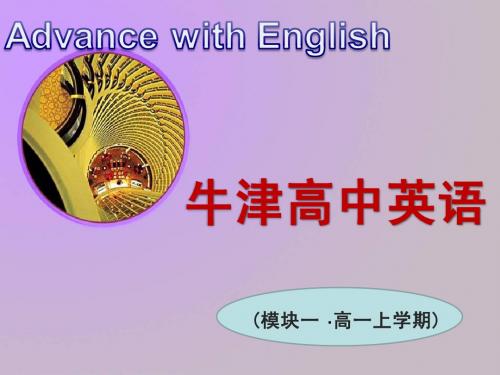
Fill in the blanks with “prep.+ which/whom”: to _____ 1. Are you interested in any songs ____which you’ve listened. on _____ 2. Tomorrow is a particular day ____ which his daughter will get married. 3. This is the knife with _____ I usually cut ____ which bread. 4. We can’t live without the sun from _____ we ____ which get heat and light. 5. The subject ____which Eric is interested is in _____ physics.
Conclusion: Relative pronoun “whose” can be replaced with “of which”, but you must pay attention to its form.
5. 你用那种方式来对待你的父亲,我不喜欢 那种方式。 You treat your father in the way. I don’t like that way.
4. 我没有参加那次会议,当时我没有认识到 那个会议的重要性。 I didn’t attend the meeting. I didn’t realize its importance at that time. I didn’t attend the meeting whose importance I didn’t realize at that time. the I didn’t attend the meeting the importance of which I didn’t realize at that time.
牛津版高一英语模块一、二_语法练习 2
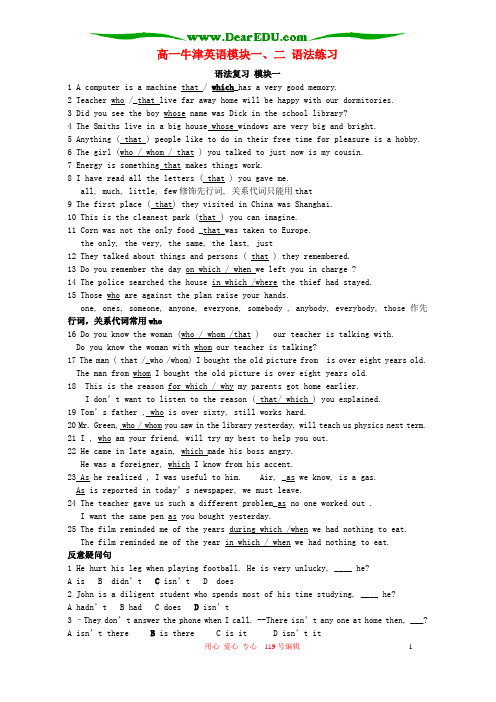
高一牛津英语模块一、二语法练习语法复习模块一1 A computer is a machine that / which_has a very good memory.2 Teacher who /_that live far away home will be happy with our dormitories.3 Did you see the boy whose name was Dick in the school library?4 The Smiths live in a big house whose windows are very big and bright.5 Anything ( that ) people like to do in their free time for pleasure is a hobby.6 The girl (who / whom / that ) you talked to just now is my cousin.7 Energy is something that makes things work.8 I have read all the letters ( that ) you gave me.all, much, little, few修饰先行词, 关系代词只能用that9 The first place ( that) they visited in China was Shanghai.10 This is the cleanest park (that ) you can imagine.11 Corn was not the only food _that was taken to Europe.the only, the very, the same, the last, just12 They talked about things and persons ( that ) they remembered.13 Do you remember the day on which / when we left you in charge ?14 The police searched the house in which /where the thief had stayed.15 Those who are against the plan raise your hands.one, ones, someone, anyone, everyone, somebody , anybody, everybody, those作先行词,关系代词常用who16 Do you know the woman (who / whom /that ) our teacher is talking with.Do you know the woman with whom our teacher is talking?17 The man ( that /_who /whom) I bought the old picture from is over eight years old. The man from whom I bought the old picture is over eight years old.18 This is the reason for which / why my parents got home earlier.I don’t want to listen to the reason ( that/ which ) you explained.19 Tom’s father , who is over sixty, still works hard.20 Mr. Green, who / whom you saw in the library yesterday, will teach us physics next term.21 I , who am your friend, will try my best to help you out.22 He came in late again, which made his boss angry.He was a foreigner, which I know from his accent.23 As he realized , I was useful to him. Air, _as we know, is a gas.As is reported in today’s newspaper, we must leave.24 The teacher gave us such a different problem_as no one worked out .I want the same pen as you bought yesterday.25 The film reminded me of the years during which /when we had nothing to eat.The film reminded me of the year in which / when we had nothing to eat.反意疑问句1 He hurt his leg when playing football. He is very unlucky, ____ he?A isB didn’tC isn’tD does2 John is a diligent student who spends most of his time studying, ____ he?A hadn’tB hadC doesD isn’t3 –They don’t answer the phone when I call. --There isn’t any one at home then, ___?A isn’t thereB is thereC is itD isn’t it4 It seldom snows in winter in Shanghai, ___?A doesn’t itB isn’t itC is itD does it5 She has already plans for the summer holidays, ____?A hasn’t sheB isn’t sheC doesn’t sheD hadn’t it6 Mother loves reading. She never spends time watching TV, ____?A does sheB will sheC have sheD doesn’t she7 It is the first time that she has been to the United States, ____?A isn’t sheB isn’t itC hasn’t sheD hasn’t it8 I don’t think he is right, ___?A do IB don’t IC is heD isn’t he语法复习模块二I 1—Alice’s second-hand computer_____ wrong although she used it only once.A goesB has goneC is goingD had gone2 Robert _____me his address the other day, but I’m afraid I ____it.A had given; lostB has given; have lostC gave ; have lostD gives; lost3 I____ nothing about it before you told me the newsA knowB knewC had knownD has known4 --What ____these days? Still busy writing your new book?--Yes, I think I can finish it next week.A do you doB have you been doingC have you doneD did you do5 --what was the film like? --Well,I____ it____ very interesting.A thought; would beB thought; may beC think; is going to beD think;will be6 It was the third time that he ____us about his story.A has toldB toldC is tellingD had told7 I forget what I was taught, I only remember what I_____.A learnB learnedC have learnedD had learned8 My younger sister____ the Youth League ____2004.A has joined; inB has joined;sinceC had joined;sinceD joined; in9 --Where____my pen?I cann’t find it anywhere.--I___it on this table,but now,it’s gone.A did you put;have putB have you put;putC had you put;was puttingD were you putting;have put10 She was praised for what she___.A had doneB has doneC would doD does11 I____ he would help me with my English, in fact he didn’t.A has thoughtB thoughtC thinkD had thought12 -- Tom,your shirt is so dirty?-- Mom, I___our storeroom downstairs and I will wash it after finishing the cleaning.A cleanedB have cleanedC was cleaningD have been cleaning13 They___ friends since they met in New York.A have madeB have becomeC have beenD have turned14 Nobody but the twins___ some interest in the project till now.A showsB showC have shownD has shown15.The students don’t want to have their supper until they ____ their experiment.A finishedB have finishedC had finishedD will finish16 By now students in Grade One ____ 1,700 English words and phrases.A should learnB have learnedC learnedD learn17 –Sorry to have kept you waiting!--I _____ here for fifty minutes.A have arrivedB have gotC have reachedD have been18 –Where have you been? I ____you the whole day.--I was in the library reading magazines.A have been telephoningB had telephonedC telephonedD was telephoned19 –Hi, Tracy , you look tired.--I am tired. I____ the living room all day.A paintedB had paintedC have been paintingD have painted20 –why didn’t you come yesterday? --I ____ ,but I had an unexpected visitor.A hadB wouldC was going toD did21 –Will you be free at three o’clock tomorrow afternoon.--No, I __ a meeting at that time.A will haveB was going to haveC will be havingD would have22 –What were you doing when I phoned you yesterday.--I ____ just finished my homework and ___to watch TV.A have; am goingB have; was goingC had; was goingD had; am going23 –My father will be here tomorrow. --Oh, I thought that he ___ today.A was comingB is comingC will comeD comes24 When we reach New York, it ____.A probably will rainB will probably be rainingC is probably rainingD has probably rained25—Is this the last exam we have to take this term?--Yes, but there ___ another test three months from now.A hasB isC wasD will be26 It was said that the machine ___ sometime the next week.A had been repairedB would repairC was to be repairedD needs repairing27 –Why did you buy this paint so early?--I ___ my bedroom tomorrow, but I changed my mind.A was going to paintB am going to paintC am paintingD will paint28 I ____ show you the photo ___ I was interrupted.A was about to; whenB was going to; when29 At this time tomorrow I __ a report in my office and I __ by noon.A will be writing ; will have finishedB will write ; will finishII Fill in the blanks30 I am going to (打算) see Mr. Li this evening.31 --Have you cleaned your room?--Sorry, I haven’t. But I will (表意愿)go and clean it at once.32 The journey that was to change Toby’s life started in July that year. (必然的情况)33 I told you Colin and I would spend a few weeks traveling. (过去将来时)34 We were going to see the wild animals, but then we didn’t have time.(过去的打算)。
上海英语牛津版二年级上m2u1课堂笔记
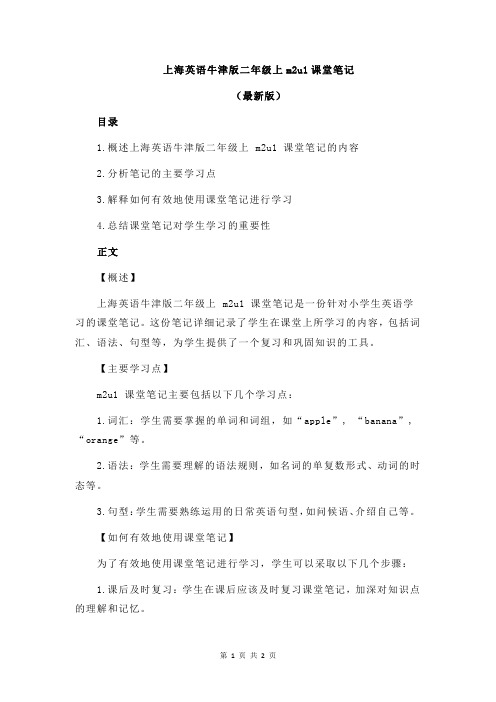
上海英语牛津版二年级上m2u1课堂笔记
(最新版)
目录
1.概述上海英语牛津版二年级上 m2u1 课堂笔记的内容
2.分析笔记的主要学习点
3.解释如何有效地使用课堂笔记进行学习
4.总结课堂笔记对学生学习的重要性
正文
【概述】
上海英语牛津版二年级上 m2u1 课堂笔记是一份针对小学生英语学习的课堂笔记。
这份笔记详细记录了学生在课堂上所学习的内容,包括词汇、语法、句型等,为学生提供了一个复习和巩固知识的工具。
【主要学习点】
m2u1 课堂笔记主要包括以下几个学习点:
1.词汇:学生需要掌握的单词和词组,如“apple”, “banana”, “orange”等。
2.语法:学生需要理解的语法规则,如名词的单复数形式、动词的时态等。
3.句型:学生需要熟练运用的日常英语句型,如问候语、介绍自己等。
【如何有效地使用课堂笔记】
为了有效地使用课堂笔记进行学习,学生可以采取以下几个步骤:
1.课后及时复习:学生在课后应该及时复习课堂笔记,加深对知识点的理解和记忆。
2.整理归纳:学生可以将笔记中的知识点进行整理归纳,形成知识体系,方便日后查阅和学习。
3.练习应用:学生可以运用课堂笔记中的知识点进行实际操作,如用所学词汇和句型进行写作或日常对话等。
【总结】
课堂笔记对学生的学习具有重要的意义。
它不仅可以帮助学生巩固课堂所学知识,还可以培养学生的自主学习能力和良好的学习习惯。
牛津译林版高中英语模块一 和模块二语法复习

牛津译林版高中英语模块一和模块二语法复习2021年秋季一加一教育高一年级英语讲义(二十)模块一﹠二语法复习编写人:蔡丹丹审核人:刘老师 2021/1/6Part I 模块一语法定语从句复1. The place _______interested me most was the Children's Palace.A. WhichB. whereC. whatD. in which 2. Do you know the man _______?A. whom I spokeB. to who spokeC. I spoke toD. that I spoke 3. This is the hotel _______last month.A. which they stayedB. at that they stayedC. where they stayed atD. where they stayed 4. Do you know the year ______the Chinese Communist Party was founded?A. whichB. thatC. whenD. on which5. That is the day ______I'll never forget.A. whichB. on whichC. in whichD. when 6. The factory ______we'll visit next week is not far from here.A. whereB. to whichC. whichD. in which7. Great changes have taken place since then in the factory _______we are working.A. whereB. thatC. whichD. there 8. This is one of the best films _______.A. that have been shown this yearB. that have shownC. that has been shown this yearD. that you talked 9. Can you lend me the book ______the other day?A. about which you talkedB. which you talkedC. about that you talkedD. that you talked10. The pen ______he is writing is mine.A. with whichB. in whichC. on whichD. by which 11. Theyarrived at a farmhouse, in front of ______sat a small boy.A. whomB. whoC. whichD. that 12.The engineer ______my father works is about 50 years old.A. to whomB. on whomC. with whichD. with whom 13.It there anyone in your class ______family is in the country?A. whoB. who’sC. whichD. whose 14. I’m interested in ______you have said.A. all thatB. all whatC. thatD. which15. I want to use the same dictionary ______was used yesterday. A.which B. who C. what D. as 16. He isn't such aman ______he used to be. A. who B. whom C. thatD. as 17. He is good at English, ______we all know. A. thatB. asC. whomD. what 18. Li Ming, ______to the concertenjoyed it very much.A. I went withB. with whom I wentC. with who Iwent D.I went with him 19. I don’t like ______ as you read.A. the novelsB. the such novelsC. such novelsD. same novels 20. He talked a lot about things and persons ________they remembered in the school. A. which B. that C. whomD. what21. The letter is from my sister, ______is working in Beijing.A. whichB. thatC. whomD. who22. In our factory there are 2,000 workers, two thirds of ____are women.A. themB. whichC. whomD. who23. You’re the only person ______I've ever met ______could do it. A.who; / B. /; whom C. whom; / D. /; who 24. I losta book, ______I can’t remember now.A. whose titleB. its titleC. the title of I tD. thetitle of that25. Last summer we visited the West Lake, ______Hangzhou is famous inthe world. A. for which B. for that C. in which D.what 26. I have bought such a watch _______ was advertised on TV. A.that B. which C. as D. it27. I can never forget the day _______ we worked together and the day______ we spent together. A. when; which B. which; when C. what;that D. on which; when 28. The way ______he looks at problems is wrong. A. which B. whose C. what D./ 29.This is the reason ______he didn't come to the meeting. A. in which B. with which C. that D. for which 30. This machine,______for many years, is still working perfectly. A. after which I havelooked B. which I have looked after C. that I have looked after D. I have looked after 31. The reason ______he didn't come was ______hewas ill. A. why; that B. that; why C. for that; that D.for which; what32. He is working hard, ______will make him pass the final exam.A. thatB. whichC. for whichD. who 33.That is not the way ______I do it.A. /B. whichC. for whichD. with which34. I have two grammars, ______are of great use.A. all of whichB. either of whichC. both of thatD. both ofwhich 35. I want to use the same tools _______used in your factory afew days ago. A. as was B. which was C. as were D.which36. My neighbors used to give me a hand in time of trouble, _______ wasvery kind of them. A. who B. which C. that D.it 37. This is the magazine _______ I copied the paragraph. A. that B. which C. from that D. from which 38. He is not sucha man _______ would leave his work half done. A. that B. whichC. whoD. as39. You can depend on whatever promise _______ he makes. A. /B. whyC. whenD. whose 40. Smoking, _______ is abad habit, is, however, popular. A. that B. which C.it D. though41. --- Did you ask the guard _______ happened? --- Yes, he told meall _______ he knew. A. what; that B. what; what C. which;which D. that; that42. I shall never forget those years _______ I lived on the farm withthe farmers, _______ has a great effect on my life.A. when; whoB. that; whichC. which; thatD. when; which43. The number of the people who _______ cars _______ increasing. A.owns; are B. owns; is C. own; is D. own; are44. During the days ________, he worked as a servant at the Browns. A. followed B. following C. to follow D. that followed 45.Is oxygen the only gas _______ helps fire burn? A. that B. /C. whichD. it46. The clever boy made a hole in the wall, _______ he could see _____was going on inside house. A. which; what B.through which; what C. through that; what D. what; that47. Is _______ some German friends visited last week?A. this schoolB. this the schoolC. thisschool one D. this school where 48. John got beaten inthe game, _______ had been expected. A. as B. thatC. whatD. who 49. I have bought two ballpens, _______writes well.A. none of themB. neither of themC. neither of whichD. noneof which 50. All that can be eaten _______ eaten up.A. are beingB. has beenC. had beenD. have been Part II语法时态的趣味分级练习题时态的趣味练习题第1级1. Don’t make so much noise . The students an English class .A. are havingB. haveC. hadD. were having 2. — Where is thelibrarian ? — She to the bookshop . A. went B. has goneC. goesD. will go 3. — Nice to see you . — I you for a longtime . — I in Beijing . I’ve just come back . A. hadn’t seen ,am B. haven’t seen , was C. didn’t see , will be D. haven’t seen , shall be4. He’ll go to work in Xi’an when he school next year .A. leavesB. is leavingC. will leaveD. has left 5.five years since we began learning English .A. There areB. It wasC. It isD. They have been6. He told the policeman that Kate near the lake at this timeyesterday evening .A. was playingB. is playingC. has playedD. plays 7. —Do you know Betty very well ?— Yes , she and I friends since we met in Guangzhou last summer .A. have madeB. have becomeC. have beenD. have turned 8. —Tom , can I borrow your book Chicken Soup ? — Sorry , I it toMary .A. lentB. have lentC. had lentD. lend9. Everyone except Tom and John there when the meeting began .A. isB. wasC. areD. were10. Dongdong has Greener China for two months .A. joinedB. taken part inC. beenD. been a member of 11.—Do you know why she Mr. Jordan tomorrow ? —She has changedher mind .A. won’t visitB. didn’t visitC. doesn’t visitD. hasn’t visited 12. It seems to me that Lucy and Lily your classmates . A. is B. are C. has D. have 13. The lady until she was 40 .A. didn’t get marriedB. got marriedC. hadn’t got marriedD. married 14. Mr. Green always tells his daughter a story before she to sleep . A. will go B. went C. is going D. goes15. By the end of last term , we three English films . A.will see B. saw C. have seen D. had seen16. — Rick ! Your jacket is wet through . Didn’t you listen to the weather report this morning ? — No , I didn’t . I was in a hurry . Besides , it when I left . A. hadn’t rained B. would rainC. rainedD. wasn’t raining 17. His sister her hometown forthree years . She’ll return next year . A. left B. has left C.has been away D. has been away from 18. China the WTO and became a new member of it last year . A. joined B. join C. willjoin D. has joined19. We will stay at home if my aunt to visit us tomorrow . A.comes B. will come C. is coming 20. — When youyour old friend ? — The day before yesterday .A. will ; visitB. did ; visitC. have ; visited时态的趣味练习题第2级1. — you TV at the moment ? —No , you can turn it off .A. Did ; watchB. Are ; watchingC. Do ; watchD. Have ; watched 2. If I free next Sunday . I to the farm with you .A. will be ; will goB. am ; will goC. am ; goD. willbe ; go3. I often my homework after supper . But yesterday evening Ia newspaper .A. do ; readedB. do ; readC. did ; readD. did ; readed4. There was an important meeting last night . Mr. Smith to it .A. was invitedB. invitedC. is invitedD. invites5. At the end of the meeting Miss Green two minutes to decide whether she should join the project or not . A. gave B. had given C. was given D. was giving6. — Your sweater looks nice , is it wool ? — Yes , and it’s Inner Mongolia . A. made of , made byB. made of , made inC. made by , made forD. made by , made from7. The old man needs at most five hours’ sleep a night , but he forover seven hours tonight . A. has gone to bed B. has slept C. has gone to sleep D. has fallen asleep 8. — you the film yet ? —Yes . I it last Saturday . A. Will ; see ; saw B. Did ;see ; saw C. Have ; seen ; have seen D. Have ; seen ; saw9. Mrs. Black with my mother when I saw her an hour ago . A. talksB. was talkingC. has talkedD. is talking 10. I have thisnice bike for more than two mouths . A. bought B. borrowed C.lent D. had 11. Be quick , the door ! You’ll just intime . A. is closing ; make it B. is closed ; miss it C. has closed ; go out D. will close ; catch it 12. — Your city looks beautiful !— Yes . Lots of trees and grass last year .A. are plantedB. have plantedC. were plantingD. were planted 13. What the forest of the US. in the last 350 years ?A. has happened toB. is happened toC. has happened atD. is happening 14. Please don’t stand up in class until you .A. were told toB. are told toC. were toldD. aretold15. I’m really getting too fat . From now on , I more exerciseand eat less food . A. do B. are doing C. have done D.will do 16. The rubbish in the river . A. is smelt bad B. smellsbadly C. is smelt badly D. smells bad 17. The radio says a wild animal zoo is to in our city . A. be building B. build C.be built D. built18. —Excuse me . What did you say you would like to do , Miss. White ?—I said I’d better go back to the office . I someone this afternoon . A. would meet B. met C. am going to D. was meeting 19. —Would you like to play volleyball with me ?—Sorry , I have to finish my diary before my mother back .A. comesB. comeC. will comeD. came20. —It must be on Channel 2 . Try that .—I that . But I still can’t get anything .A. will tryB. tryC. have triedD. tried时态的趣味练习题第3级1. Jack his homework yet ; so he won’t go out with his friends .A. finishesB. has finishedC. doesn’t finishD. hasn’t finished 2. —How do you like HangZhou , Miss Read ? —Sorry , I there .A. have goneB. have beenC. haven’t goneD. haven’t been3. — to the United States ?—No , never , but I went to Canada a few years ago .A. Have you beenB. Have you goneC. Did you goD. Willyou go 4. —Do you know why she Mr. Wang tomorrow ? —She has changed her mind .A. won’t visitB. didn’t visitC. doesn’t visitD. hasn’t visited 5. His grandfather for over two years .A. has diedB. has been deadC. has deadD. died 6. This painting to a museum in New York in 1977 . A. sells B. sold C. was sold D. is sold 7. We’ll go for a picnic if it this Friday .A. won’t rainB. isn’t rainingC. doesn’t rainD. don’t rain 8. —Dad , please open the door , it . —Ok , dear . I am coming .A. locksB. lockedC. is lockedD. was locked 9. When we got to the cinema , the film for ten minutes .A. had begunB. has been onC. has begunD. had been on10. I’m sorry , Mr. White can’t see you now . He a meeting . A. has B. has had C. is having D. will have11. I don’t know if he will come . If he , please let me know .A. will comeB. comeC. comesD. is coming12. Jack to several places in North China since he came to Beijing with his parents . A. was traveling B. had traveled C. is traveling D. had traveled 13. I wasn’t at home yesterday . I to help with the harvest on the farm . A. asked B. was asked C. was asking D. has asked 14. —I can find few children in the classroom . Where are they ?—They the World Cup Football Games on TV in the hall .A. watchB. have watchedC. watchingD. are watching 15. —When this kind of computer ? —Last year .A. did, usB. was , usedC. is , usedD. are , used 16. “ Harry Potter ” is a very nice film . I it twice .A. will seeB. have seenC. sawD. see17. The old man was quite weak after the accident , so he . A. must be take care of B. must take care of C. must be looked after D. must look after 18. —Don’t forget to post this letter for me , please . —No , I .A. don’tB. won’tC. mustn’tD. can’t19. Linda often her homework in the evening , but this eveningshe TV . A. does ; watches B. is doing ; is watching C. does ;is watching D. is doing ; watches 20. —It’s time to do your homework ,Jack .—Yes , Mum . I’ll turn off the TV as soon as the programme .A. endsB. endC. will be endedD. will end时态的趣味练习题第4级1. Both Lily and Lucy to the party yesterday .A. invitedB. was invitedC. had invitedD. were invited 2.I first met Mary three year ago . She at a radio shop at the time .A. has workedB. worksC. was workingD. will work3. Bill might phone while I’m out this evening . If he , couldyou take a message ? A. does B. might C. phoned D. will4. Another new library last month in my hometown . A. builtB. was builtC. has been builtD. is built 5. It’s about ten months since the boy a Young Pioneer . A. became B. has become C.has been D. had been 6. — Your E-mail address again ? I quite catch it . — Fed langhter @ 263. comA. don’tB. can’tC. won’tD. didn’t7. — Where is Mr. Green now ? I haven’t seen him for a few days . —He to Hong Kong .A. goesB. will goC. is goingD. has gone8. A lot of food to that country after the war was over . A.was sent B. are sent C. is sending D. sent 9. The world .Things never stay the same .A. changesB. is changingC. was changingD. will change 10.— Oh , Mrs. King , your necklace looks nice . Is it new ? — No , I it for two years .A. hadB. have hadC. boughtD. have bought 11. The magazines to the library in two weeks .A. must returnB. must be returnedC. returnedD. must be returning12. — John , you the computer game for two hours . It’s badfor your eyes . Stop , please . — OK . Mum .A. playedB. have playedC. were playingD. play 13. —It’s more and more important to protect our earth .—I agree with you . If everyone a contribution . A. makeB. makesC. will makeD. made 14. He won’t leave his office untilhe his work .A. will finishB. finishesC. is finishingD. finish 15.We will talk about the problem as soon as we time . A. had B.have C. had had D. will have16. — Have you ever Lintong to see Terra Cotta Warriors ? —Yes , I have .A. went toB. gone toC. been inD. been to17. I’m sorry you’ve missed the train . It 10 minutes ago .A. leftB. has leftC. had leftD. had been left18. Even hot sun cannot make the place dry because green plants there . A. are growing B. will grow C. grew D. grows 19. —What are on show in the museum ?— Some photos by Africa children .A. are takenB. were takenC. takenD. have been taken 20. — Did you see Tom at the party ?— No , he by the time I got there .A. leftB. was leavingC. had leftD. has left时态的趣味练习题第5级1. — Sorry to have interrupted you.Please go on.— Where wasI?— You _____ you didn't like your father's job.A. had saidB. saidC. were sayingD. had been saying 2. I arrived late;I____ the road to be so icy . A. wouldn’t expect B. haven’t expected C. hadn’t expected D. wasn’t expecting 3. I _____ while reading the English textbook . Luckily , my roommate woke me up in time! A. had fallen asleep B. have fallen asleep C. fell asleep D. fall asleep4. Now that she is out of a job,Lucy_____ going back to school,but she hasn’t decided yet . A. had considered B. has been considering C. considered D. is going to consider5. The mayor of Beijing says thatall construction work for the Beijing Olympics______ by 2006 . A. has been completed B. has completed C. will have been completed D. will have completed6. The teacher , with 6 girls and 8 boys of her class , ______visitinga museum when the earthquake struck . A. was B. were C. had been D. would be 7. — What were you doing when Tony phoned you?— I had just finished my work and ____to take a shower .。
牛津版-英语-模块二-语法复习
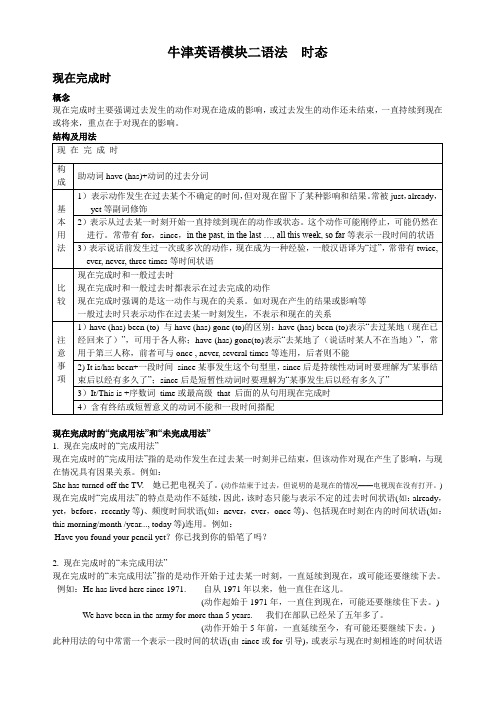
牛津英语模块二语法时态现在完成时概念现在完成时主要强调过去发生的动作对现在造成的影响,或过去发生的动作还未结束,一直持续到现在或将来,重点在于对现在的影响。
结构及用法现在完成时的“完成用法”和“未完成用法”1. 现在完成时的“完成用法”现在完成时的“完成用法”指的是动作发生在过去某一时刻并已结束,但该动作对现在产生了影响,与现在情况具有因果关系。
例如:She has turned off the TV. 她已把电视关了。
(动作结束于过去,但说明的是现在的情况——电视现在没有打开。
) 现在完成时“完成用法”的特点是动作不延续,因此,该时态只能与表示不定的过去时间状语(如:already,yet,before,recently等)、频度时间状语(如:never,ever,once等)、包括现在时刻在内的时间状语(如:this morning/month /year..., today等)连用。
例如:Have you found your pencil yet?你已找到你的铅笔了吗?2. 现在完成时的“未完成用法”现在完成时的“未完成用法”指的是动作开始于过去某一时刻,一直延续到现在,或可能还要继续下去。
例如:He has lived here since 1971. 自从1971年以来,他一直住在这儿。
(动作起始于1971年,一直住到现在,可能还要继续住下去。
) We have been in the army for more than 5 years. 我们在部队已经呆了五年多了。
(动作开始于5年前,一直延续至今,有可能还要继续下去。
) 此种用法的句中常需一个表示一段时间的状语(由since或for引导),或表示与现在时刻相连的时间状语(如:up to now,so far到目前为止)等。
例如:I have heard nothing from her up to now. 到目前为止我没有她的任何消息。
- 1、下载文档前请自行甄别文档内容的完整性,平台不提供额外的编辑、内容补充、找答案等附加服务。
- 2、"仅部分预览"的文档,不可在线预览部分如存在完整性等问题,可反馈申请退款(可完整预览的文档不适用该条件!)。
- 3、如文档侵犯您的权益,请联系客服反馈,我们会尽快为您处理(人工客服工作时间:9:00-18:30)。
3. The boy _____al Nhomakorabeaeady _____home.(come)
4.The police ______just _______(finish) searching the areas.
5.表示到现在为止的一段时间内重复发生的动作。
6.现在完成时常常与序数词和最高级连用。
7.现在完成时经常与so far, until, by now, up to now, in/over/for the past few years连用。
Exericises:
1.The disappearance of Justin_______(make)Kelly very unhappy.
2).表示总结或说明(例3)
3).表示经历或经验(例4,5)翻译为:…….了;……啦;…..过。
2.表示从过去某一时间开始一直延续到现在的动作或状态。
3.常与already, yet, just, never, ever, recently, lately, since等时间状语连用。
4.表示刚刚结束的动作。
3.To be skilled to use and put them into daily life
自我构建快乐无限
一、我感悟
1. I can not open the door. Ihave lostthe key.
2. I am delighted to tell you that youhave passedthe exam.
7. My clothes are all wet. Ihave been workingin the rain.
Form:has/have been doingsomething
我继续总结:现在完成进行时
表示动作从过去某一时刻开始,一直延续到现在,可能仍然继续发生;也可能刚刚终止,但对现在产生影响。强调动作的持续不停,反复性和决心。
6. How longhaveyoubeeninBeijing? Ihave been inBeijingfor four years.
7. Hehas livedhere since 1980 since yesterday/ last year/ 10 years ago/ ever since.
11. I will give you my opinion after Ihave readthrough the book.
Form:has/have done something
我总结:现在完成时
1.表示动作到说话时刻已经完成。
1).表示过去发生的某一动作对现在造成的影响或产生的结果.(例1,2)
2. Aren’t you tired?Youhave been ridingfor three hours.
3.The farmers started working in the field an hour ago, and they are still working now,and may continue.Theyhave been workingin the field for an hour.
5. Some villagers say that they ________UFO many times.(see)
合作探究携手共进
二、我继续感悟:
1. The boy started having dinner five minutes ago. He is still having dinner now.The boyhas been havingdinner since five minutes ago.
4. Ihave been waitingfor you since 8 o’clock in the morning.
5. All these years theyhave been contributingarticles to our magazine.
6. Dad looks very tired. Hehas been workingin the garden all day.
年级
高一
学科
英语
总课时
课题
M2U1 Grammar
第________课时
主备人
赵青
上课时间
2013012
锁定目标找准方向
备注
1.To master the present perfect tense and present perfect continuous tense
2.To understand the difference of them
Exercises:
1.The telephone ________________ (ring) for quite a while. Why _________anyone__________ (not answer) it?
2. Now that she _______(lose) job, Lucy __________________(consider) going back to school, but she has’t decided yet.
8. Priceshave fallensharply in/over/for the past six months.
9. This isthe most interestingbook that Ihave ever read.
10. This isthe first timethat youhave beenhere.
3.Wehave set upmany new factories in this area.
4. -----Haveyouhadyour lunch yet? ----Yes,I have. Ihave just hadit. And I had it at home.
5. ---HaveyoubeentoAustralia? ---Yes, I have. Ihave beenthere three times. And I went there with my uncle for the first time.
